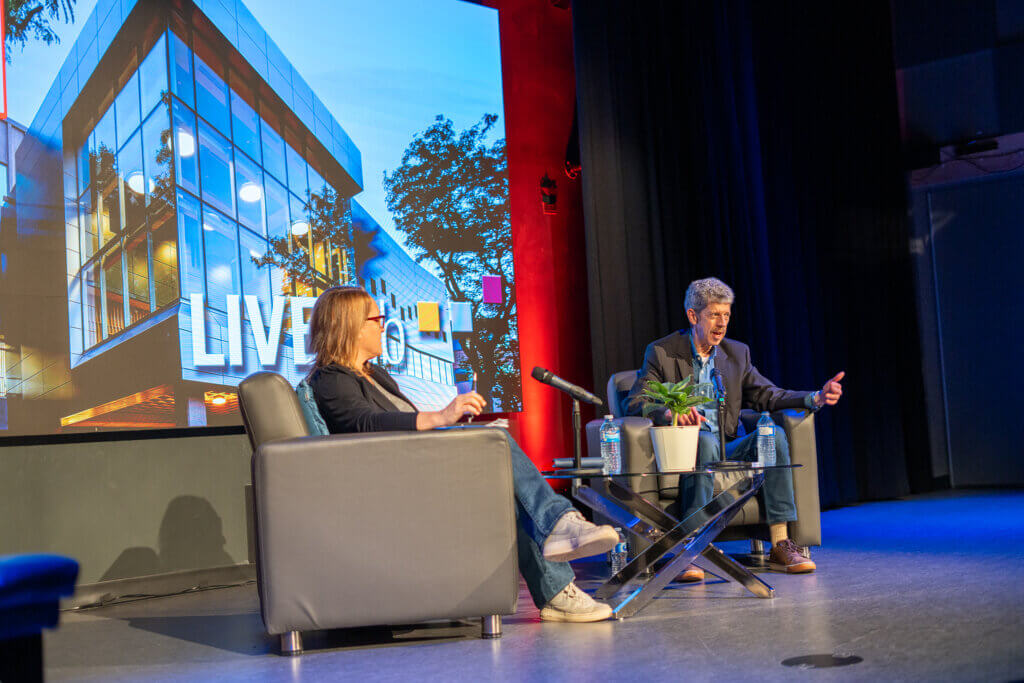By: Danielle Collado
This Financial Literacy Month, we welcomed finance experts Rob Carrick and Roma Luciw back to McMaster for a candid conversation about personal finance and money management. Rob is a personal finance columnist and Roma is a personal finance editor at The Globe and Mail. Together, they host a podcast called Stress Test, that focuses on demystifying common financial topics for a gen-z and millennial audience.

How can financial literacy benefit you? For one, it can help empower and equip you with the tools to make the best financial decisions for you.
Here’s how Rob and Roma addressed three pressing financial topics:
Managing financial pressure
Rob and Roma start by acknowledging that the costs associated with getting a university education have gone up quite a bit in recent years. Many of the questions they received from students were around how to set yourself up financially by investing and saving. However, with financial pressure at an all-time high, Rob’s number one piece of advice for students is to avoid accumulating more debt.
There will be time to invest once you’ve graduated and have started earning an income, but it is best to “contain your debt to your student loans, if you have student loans. If you’re able to save a little bit, I think that’s great,” says Rob. If possible, he suggests keeping an emergency fund in a high interest savings account. This is a risk-free place to park your savings and earn between 2 to 3% interest, so you have a cushion for when you need a new laptop or you get an expensive dental bill.

Investing as a student
Rob shares that it’s best to invest with money you won’t need in the next few years. This means that if you have not accumulated any debt, and you have money left over after you’ve paid for the essentials and contributed to an emergency fund, you could invest that cash. “In order to have almost a guaranteed great outcome from stock market investing, you have to have a 10-year horizon. Less than that, you’ve got to think about saving and keeping your money safe,” says Rob.
As a student, Rob advises avoiding paying extra fees associated with banking and investing alike. Nowadays, there are lots of options available to you. So, do your research, and make sure you are making an informed decision when choosing who to trade with.
Lastly, it’s also okay to start small when it comes to investing, even as little as $10 will help you get started.
Job searching as a new graduate
“How many of you guys are getting close to graduating?” Roma asks. About half the room raises their hand.
Roma shares that on Stress Test, they talk about how to build and start careers. This includes what to negotiate when it comes to job offers. “One of the best things you can do is negotiate things that are feasible,” says Roma.
Salary can be negotiated, but “benefits can be worth thousands of dollars,” says Rob. Things like dental work, medical care, mental health support, physiotherapy and massage can cost hundreds, sometimes thousands of dollars, and having benefits can save you from paying out of pocket.
One student in the audience shares that they currently have two job offers on the table: one offers a lower salary with a better projected career growth, and the other offers a higher salary and better benefits, but less projected career growth.
Roma asks, “which one are you more excited about?”
If you find yourself in this scenario, especially in this financial climate, Rob suggests asking yourself some important questions. For example, is this the career you want? The answer can help determine whether career growth is a worthwhile focus when evaluating offers. Additionally, consider whether you have debts to pay off. If so, a higher salary can help you lower that debt at a faster rate.
To learn more about these topics from Rob and Roma, visit The Globe and Mail’s website and subscribe to the Stress Test podcast.